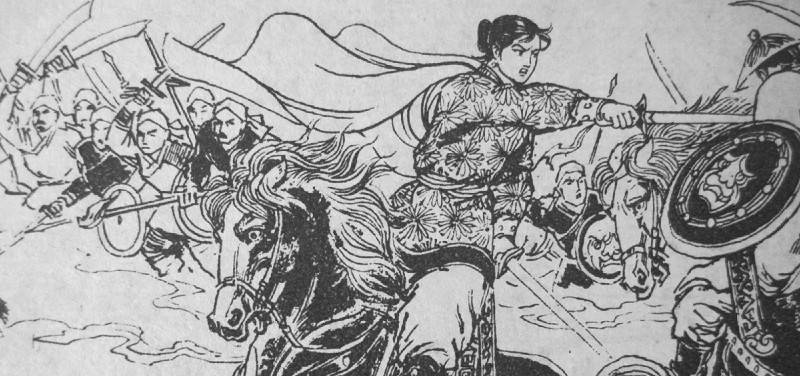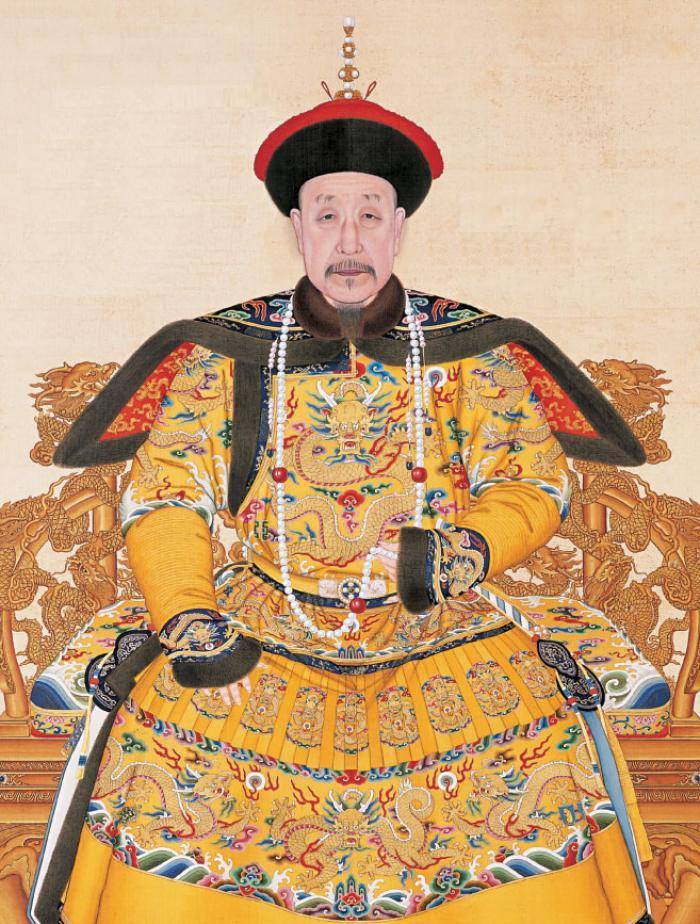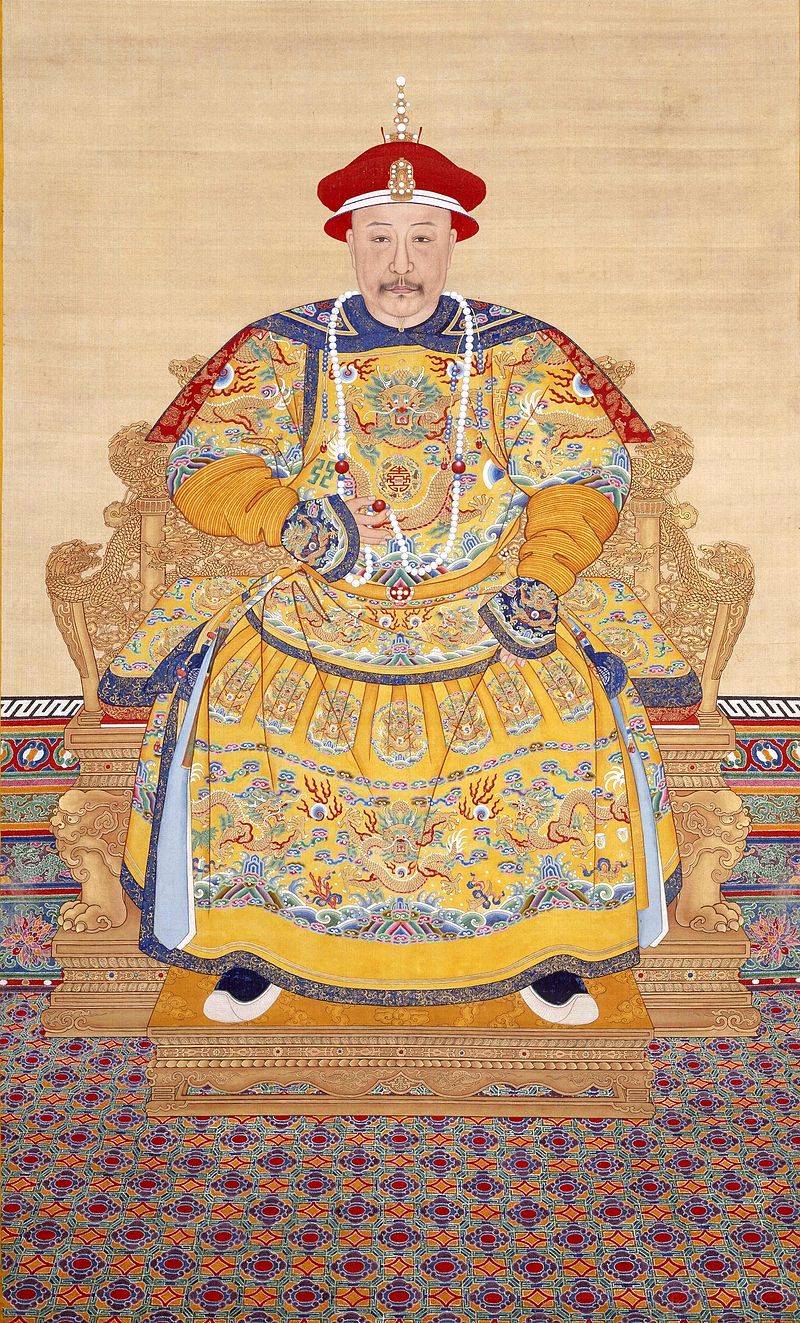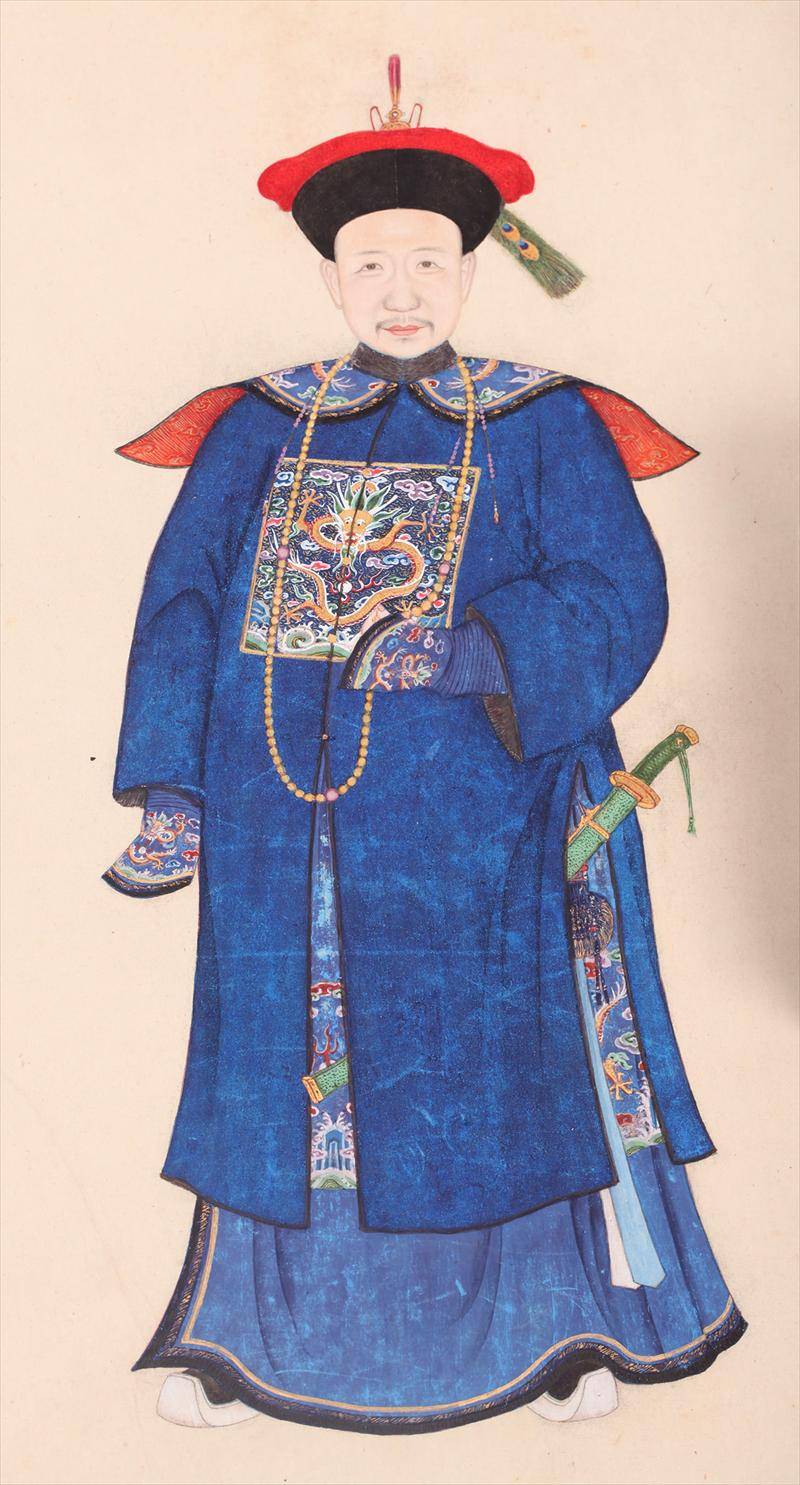"Horse witches" and the approach of the "Era of the white sun"

In China, restless
In February, 1796 of the year happened what all simple Chinese people had been waiting for so long - the sixth emperor of the Qing Hongli dynasty abdicated the throne. He ruled the country for nearly sixty years and this long irremovability of power led to sad consequences. The sovereign no longer delved into the life of his vast country. Authorities, in fact, were received by local officials who did not obey anyone and considered themselves god-like creatures. The crisis, like a cancer, struck all without exception the spheres and areas of the state. And corruption just went to the cosmic level (the treasury was looted so fast that, for example, ordinary soldiers could not receive their salaries for several months). Emperor Hongli, who was eighty-five years old at the time of the abdication, relied on his favorite, Heshen, in everything. But the old man made a wrong choice. Heshen had only one interest - wealth. By "unleashing" the sovereign, he received a comprehensive power and access to the treasury, which he actually used. About his untold riches in China made up legends. And when Hongli handed over the throne to his fifteenth son, Aixingero Yungyan, the favorite did not lose his privileged position. The new emperor hated Heshen and rightly considered him one of the main culprits of the deplorable situation in the country, but he could not deal with him, so to speak, as a man. Old Hongli was worried about the fate of his favorite and defended him diligently. Yunnyan's choice, in fact, was not. He could not go against the will of his father. Therefore, he could only wait for the death of the royal relative. Heshen himself considered himself, if I may say so, immortal. He continued his policy under the new emperor, considering him, like Hongli, a “rag doll,” which for a species sits on a throne. Yunyan didn’t like this situation, and he was just waiting for the moment to deliver a single crushing blow to the enemy.
In the meantime, the emperor took up the current problems. At the time of his coming to power, the country reached a boiling point. In China, the Peasant War broke out in 1796, which was organized by the secret (underground) Buddhist society of the White Lotus Teachings. This sect, taking advantage of the weakness and narrow-mindedness of power, managed to concentrate enough power in its hands to raise a rebellion.

That same February, 1796, a rebellion broke out at once in the two northern counties of Hubei Province. And while the local authorities swayed and slowly analyzed what had happened, the insurgency, like a forest fire, spread to other counties. Thus began the peasant war, which tormented China for eight years. Soon, hotbeds of discontent flared up in the provinces of Sichuan and Shaanxi. At first, the rebels did not meet with organized resistance. Time after time they managed to emerge victorious from confrontations with the soldiers of the emperor. Therefore, in a short time, the rebels managed to capture about a dozen cities and gain a foothold in them. But still, the initial balance of power was on the side of the government forces. And so the rebels, taking control of a large area, stopped and began to prepare for its defense. This move was quite logical, because the rebels needed to restore their strength and their numbers. However, soon they again came to the "warpath". Only now the rebels did not try to capture the city. They carried out "agitation work" among numerous villages and villages. As for the emperor's troops, they, of course, fought, but they did it lazily, with great reluctance.
The problem was that the crisis dealt a crushing blow to the entire vertical of power. The state apparatus, so to speak, began to decay at a heightened pace, infecting the "eight-named troops." Accordingly, their combat effectiveness left much to be desired. The problem was aggravated by the fact that small officials (and with them the commanding staff), like vultures, flew at the treasury and looted it with fantastic speed. Soldiers were not paid salaries and, moreover, they could have been delayed in giving rations for days or even weeks. What kind of war with insurgents could we talk about in such a state of affairs? In fact, in order not to die of hunger and not become financially bankrupt, the soldiers had only one way out - to rob civilians. It is clear that no attitude of the leadership can be an excuse for such actions, but the fact remains that it was the chiefs who forced the soldiers to become robbers. Emperor Yungyan saw it all, but his hands were tied by his father. After all, he instructed the choice of military leaders of his favorite. And Heshen appointed them according to the principle “paid - got a position”. Naturally, the nominees of the favorite, for the most part, had no idea how to fight and how to command the troops. They specialized in the plundering of the state treasury. And so, when the rebellion began, the commanders were simply frightened and hid in the bushes. And they took out their anger on the civilian population. The country began to turn into a branch of hell on earth.
At the very beginning of the uprising a young girl appeared in the ranks of the rebels - Tsun'er Van. She came from a very wealthy and wealthy peasant family. The situation in the country did not particularly worry her, she just lived her life. Her brother Wang Tingzhao received a good education and taught at the county school. Just a year before the uprising, Zong'er married Qi Lin. Marriage was equal, because the guy also came from a fairly wealthy peasant family. He, having received the necessary education, returned to his small homeland and took the position of one of the minor officials. But their happiness of young people turned out to be fleeting. The fact is that Qi Lin was not just a member of the “White Lotus”, he was one of the leaders of an underground society in Xiangyang Province. This cult, of course, was soon joined by Connier. She fully shared the views and ideas of her husband. And when the uprising began, young people were among its leaders. But Qi Lin was soon identified and arrested. In fact, he did not even have time to take part in any armed conflict. Of course, Connier attempted to free her spouse, but her attempts ended in failure. And then the woman found out that her husband was dead. This event divided Conner’s life into “before” and “after”. She began calling herself the widow Qi Wang and vowed to avenge the death of her husband. Her brother Wang Tingzhao supported his sister and also joined the uprising, leading one of the rebel armies.
Very quickly, Qi Wang managed to get almost a leading role in the whole rebellion. Since the White Lotus promoted gender equality, no one saw the problem that a woman became the leader of the uprising. Moreover, her comrades actively helped in achieving this goal. Qi Wang did not sit out in the offices, she was always ahead of the army and rushed at the enemy without fear, realizing that only courage can bring the advance of the blissful "Era of the White Sun". Yao Zhifu, an associate and disciple of the late Qi Lin, became her closest ally and friend.
Literally after a couple of battles on government troops, rumors spread that there was a woman at the head of the rebel army. These legends were reinforced by the stories of soldiers who saw Qi Wang in action. Thanks to this, the reputation of a woman has become stronger in a very short time. The warlords of the emperor considered her their main enemy, while the civilian population of China saw her as their main protector. But in fact, Qi Wang was not the commander-in-chief of the entire rebel army. As you know, fear has big eyes. She commanded only a separate cavalry corps, consisting exclusively of women. And this division was called "horse witches".
Two years of war
Qi Wang for a short period has become a real legend in life. The common people literally idolized it, endowing with the best qualities that are only inherent in man. So in the legends, which the peasants enthusiastically told each other, Qi Wang was distinguished by wit, analytical skills, a commander of genius, fantastic power, bestial instincts and dexterity. In this case, the woman had a magical charm and, of course, divine beauty. In general, the government soldiers were opposed, so to speak, by the superman. This legend, by the way, was actively supported by its colleagues on the “White Lotus”. In a secret society, they perfectly understood that the mystical-magical component is extremely important for victory.
According to legend, Qi Wang personally selected women for her unit. Only those who were in no way inferior to men could get into the “horse witches”. She paid special attention not only to strength, dexterity and ability to handle weapons, but also appearance. "Witches" must have been beautiful and graceful. This detachment most annoyed the imperial military leaders. The fact is that they did not share the views of the “White Lotus” on gender equality, therefore, they perceived the “witches” as a direct threat to the traditional patriarchal foundations. Qi Wan herself understood this. She specially positioned herself as a counterbalance to the established traditions. The woman tried to prove that she was able to compete with men in all areas. Starting from the sharpness of the mind and ending with authority among people. And I must say, this confrontation is left for Qi Wang. The people idolized her. And the stories about the proud and beautiful warrior reached even the most remote Chinese villages. Even her men admired her and her “witches”. They became for representatives of the stronger sex such an example to follow. Naturally, this caused fits of rage and rabies among all supporters of the traditional way of life, in which the woman was assigned the quiet and modest role of a slave for her father, and then for her husband.
It is not known exactly how many battles Qi Wang and her "horse witches" took part in. It is believed that in two years of hostilities she went into battle about three dozen times and always won. One of the most famous battles took place in August 1797 of the year near Baydichen, in the province of Hubei. In that battle, the government commander was probably commanded by the only commander who did not receive the position for a bribe — De Lantai. He was distinguished by cruelty, stubbornness and bestial instincts. There were legends that he could see people through and even read the thoughts of enemies. And so, De Lantai clashed in an uncompromising battle with Yao Zhifu's army. The commander of the government forces knew perfectly well that Zhifu did not walk alone. Once he is here, it means that “horse witches” along with the hated Qi Wang are in proximity.

The battle lasted all day. The battle began with the traditional shelling, but very quickly it grew into a fierce hand-to-hand fight. De Langtai saw that his soldiers were very tired, urgently needed to enter into the battle reserve forces. But he was not in a hurry with this order, since Yao Zhifu sought precisely this from him. The rebel commander was waiting for this move to release Qi Wang and her "witches" on the battlefield.
And yet it was Zhifu who could not stand the first. Suddenly De Lanty saw a cavalry detachment pass through enemy infantry, like a knife through butter. At the head of the division was twenty-year-old Qi Wang. She rushed forward and shouted loudly, “Mila was reborn!”. This slogan quickly picked up the rest of the cavalry. Like a snow avalanche "witches" covered the government army. It was only after this that the imperial military commander ordered the reserve forces to be brought into battle. His infantry wavered and began to retreat. "Witches" happily screamed, thinking that the victory was in their pocket. But they did not know that the experienced and cunning De Lantay had prepared a surprise for them. Suddenly, his infantry scattered to the side, freeing up space for artillery. And then the rumble of cannon shots sounded. The imperial warlord had no doubt that this blow would break Qi Wang and her female warriors. But he was wrong. The women did not flinch and continued the attack. Then De Langty sent his last reserves to battle. And only in number, government soldiers somehow managed to stop the onslaught of Qi Wang. The imperial warlord breathed a sigh of relief. He managed to hold out until the night. Now it's time to take the disappointing outcome of the confrontation.
The commander was promptly informed of the great losses of those killed and wounded. About a thousand soldiers were captured. The surviving warriors were severely exhausted and practically could no longer hold weapons in their hands.
However, things did not go according to plan. De Lantai hoped that at night the enemy would not attack. So, his soldiers will receive much-needed rest. But that did not happen. As soon as it got dark in the rebel camp, thousands of torches broke out and, merging into a single stream of fire, they headed towards the government army. De Lantai ordered to prepare for a "welcoming" meeting. As expected, in front of the rebel troops were "horse witches". And they were expectedly greeted by cannons. The warlord of the emperor is already rather tired of everything that is happening. He threw all his reserves into battle in order to end the annoying, like flies, insurgents. But the courage with which the rebels fought terrified the exhausted soldiers of De Lanta. The battle continued until dawn. And only when the first sunshine lit up the sky, the rebel army began to retreat. The last battlefield left the "witches". De Lantai watched as Qi Wang and her warriors headed towards Wushan Mountain, the main shrine of the White Lotus Society. But the order to the pursuit of the commander did not give. Who knows, suddenly the insidious Qi Wang decided to trap him? The commander had no right to risk in this situation. De Langtai did not doubt that sooner or later, but a bloody massacre of all the "witches" would still happen.
It was the second year of the rebellion. The rebels, occupying an impressive territory, fought off attacks by government forces. And the outcome of the confrontation was vague. The authorities understood that to succeed it was necessary to behead the rebels. But eliminating required not only Yao Zhifu, but also Qi Wang. Then, without their leaders, the rebels would have faltered. As it was impossible to deal with this couple on the battlefield, officials and military commanders announced hunting for them. Various traps were prepared for Zhifu and Qi Wang, numerous ambushes were organized. But all efforts were in vain.
The tragic for the leaders of the rebels occurred in the spring of the year 1798. And at first success was on the side of Yao Zhifu and Qi Wang. They managed to inflict several painful defeats to the government army, but in April the tale was over. In Hubei Province, the rebels clashed with a powerful army, which greatly outnumbered the rebel army. That fight was the last one for both Yao Zhifu and Qi Wang. The army of rebels was defeated, almost all the "horse witches" died in that fateful battle. Qi Wang and Yao Zhifu were surrounded. They were not going to kill, they were needed alive. And then the rebel leaders miraculously managed to escape from the encirclement and were thrown off the cliff. They did not succeed in achieving the “Era of the White Sun” ...
But, despite the expectations of the authorities, the insurgency quickly failed to suppress. Having learned about the death of the leaders of the “White Lotus”, the common people rallied stronger, and the volunteers were drawn into the rebel army. The Chinese wanted to avenge Qi Wang and Yao Zhifu, because they were not just heroes for them, but the only hope for a bright future.
* * *
The peasant war continued until the 1804 year. With great difficulty, but still it was the government army that was able to win. True, this required a colossal sum for those times - about two hundred million silver lians. In fact, after the end of the war, the emperor's treasury was empty. In addition, several million people were drawn into the war, which, of course, suffered greatly both morally, physically and financially. But the main problem that arose after the end of the war was the formation of numerous predatory gangs. They included representatives of the White Lotus, peasants dissatisfied with the authorities, as well as deserters. The gangs were well armed and had combat experience. Over the years of confrontation, they lost the habit of honest labor and were not going to return to the past life. This problem needed to be resolved on an emergency basis. And then the authorities decided to announce a total demobilization. It just happened the other way around, instead of laying down their arms, the gangs rallied and already in 1805, they raised a new uprising. It happened in Shaanxi and Sichuan. And soon they were joined by soldiers of the "green banner troops." These soldiers were unhappy with regular salary delays and poor supply.
In general, the beginning of the nineteenth century turned out to be difficult for China. In the provinces of Huan and Guizhou, a Miao revolt blazed for five years. In the Huizhou region of Guangdong province, the local poor also united against the emperor, united by the "Society of Heaven and Earth." Back in 1800, the Pirate War began, which lasted ten years. Against the Qing emperor came the sea robbers of the South China and East China Seas. We managed to cope with them only with the help of fleet Nguyen - rulers of northern Vietnam.
In 1813, a rebellion broke out in the Heavenly Mind sect, an offshoot of the White Lotus. And the rebels even managed to break into the imperial palace! But thanks to the actions of Prince Miannin (later he will become the emperor of Daoguang) in 1814, the rebellion was suppressed. And only after that for some time the situation in China calmed down a bit.

As for Heshen, a favorite of Emperor Hongli, his story broke off in 1799 year, immediately after the death of the former sovereign. As soon as it became known about the death of Hongli, Yongyang ordered his arrest. And soon Heshen was sentenced to death. True, then he was offered to solve the problem on his own - just hang himself. It was a proposal from the category of those who are not refused.
Information